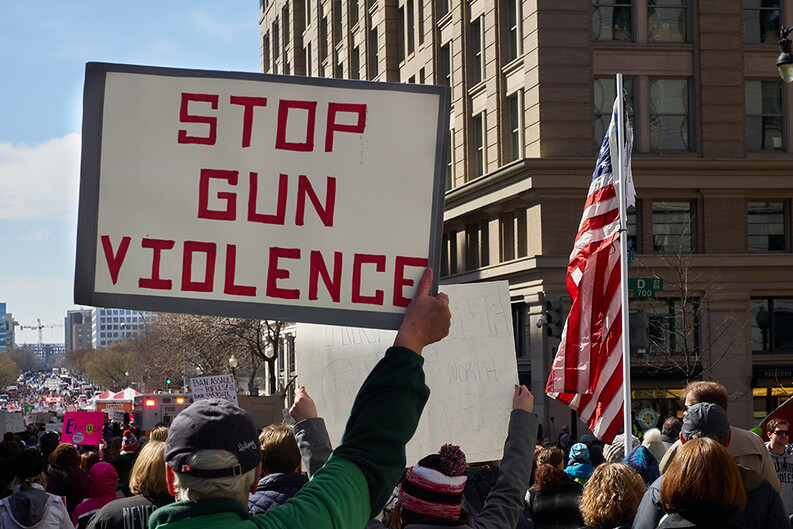Faculty Research Puts Gun Violence in Focus

The mass shooting in Uvalde, Texas has again intensified the call for solutions to gun violence. In 2020, three Yale Law School professors — Ian Ayres ’86, Abbe R. Gluck ’00, Tracey L. Meares — guest-edited an issue of The Journal of Law, Medicine & Ethics as the culmination of special Yale Law School course, The Law, Policy, and Guns. The issue, “Gun Violence in America: An Interdisciplinary Examination4,” pulls together scholars and practitioners from medical, legal, and academic fields who offer new perspectives and approaches. Ayres, Gluck, and Meares, discuss their contributions below.
Ian Ayres ’865, a lawyer and economist, is the Oscar M. Ruebhausen Professor at Yale Law School and a Professor at the Yale School of Management. In 2020, Ayres and co-authors Zachary Shelley and Fredrick E. Vars ’99 wrote about their research into the effect of Walmart discontinuing gun sales on the rates of suicide by firearms. More recently, Ayres and Vars argue in their book Weapon of Choice: Fighting Gun Violence While Respecting Gun Rights that the U.S. can decrease the number of gun deaths through a decentralized, libertarian approach.
In your latest book, you argue that we can decrease the number of gun deaths by empowering individual citizens to choose gun reforms for themselves. Can you explain how this theory might work? And what role should private industry have in helping reduce gun deaths?

Traditional gun control is top-down state control. The government decides which guns and people should be restricted, then attempts to enforce these restrictions. Our book’s proposals instead empower people. It first searches for individual members of society who have sufficient information and incentives to take action to reduce gun violence. It then tries to give these decentralized actors new actions that they can take. Instead of imposing one-size-fits-all rules on society, it gives individuals the liberty to reduce the risk of gun violence.
We apply the bottom-up ideas of libertarian decentralization to propose 10 different policies that could be adopted at the state level. The most important, gun-control proposal is a kind of self-control. A model statute that we call Donna’s Law empowers individuals to temporarily suspend their ability to purchase and possess firearms. Prior research demonstrates that even a short delay in gun acquisition can reduce suicide, and a large percentage of the population would self-restrict in this manner. Many lives could be saved without any new government mandate. Our survey finds that well over 60% of the general population support the proposal, including most gun owners. Versions of Donna’s Law have been introduced now in dozens of states and enacted in three states. Freedom-enhancing gun control is not an oxymoron and has the great advantage that it is politically feasible.
The journal issue has two articles that resonate with this approach. “The Walmart Effect” shows how empowering private businesses can save thousands of lives. Specifically, we estimate that Walmart’s 1994 decision to discontinue the sale of handguns robustly reduced the number of suicides in affected counties. And the “Guest with Guns” article shows that we can enhance property owners liberty to control their land by better conforming legal presumptions to their preferences about who can bring firearms onto their property.
Abbe R. Gluck ’006 is the Alfred M. Rankin Professor of Law and the Faculty Director of the Solomon Center for Health Law and Policy7 at Yale Law School. She is also a Professor of Internal Medicine (General Medicine) at Yale Medical School. Gluck, with co-authors Alexander Nabavi-Noori ’22 and Susan Wang ’21, survey the field of cases in which gun violence victims and stakeholders have sued the gun industry. Despite the special challenges of litigation against gun makers, the co-authors find that these litigants have had some success.
You have written that litigation cannot solve a public health crisis, but it can be an effective tool to complement regulation. What are the best ways to effectively use litigation to address the growing and urgent epidemic of gun violence?

As we have seen in contexts from tobacco to opioids, litigation can be a powerful tool in galvanizing the regulatory response necessary to address a public health crisis. Litigation can increase the salience of a public health issue, elicit closely guarded information to move public opinion, and prompt legislative action. When it comes to suits against gun violence, however, litigation has faced significant and unusual obstacles— but the tide may be turning.
First, legislation had essentially prevented use of federal funds for research on gun violence, but that changed in 2020, when Congress authorized $25 million in CDC and NIH research. Second, Congress in 2005 legislatively immunized the gun industry from most kinds of gun-violence related lawsuits with the Protection of Lawful Commerce in Arms Act (PLCAA) — a protection not replicated in any other field. But just a few months ago, in a major case out of the devastating Newtown shooting here in Connecticut that worked around PLCAA’s protections, nine victims’ families received a historic $73 million settlement against the manufacturer, whose marketing tactics, plaintiffs had argued, violated state law. Other states have taken note and are starting to enact laws to take advantage of the state-law exception PPLCA provides. A federal judge recently threw out a challenge to New York’s version of that new law, paving the way for litigation.
Another missing piece of the puzzle has been the dearth of aggregate, large-scale, litigation, whether class actions, multidistrict litigation, or multistate actions by state attorneys general. Such industry-wide, high-leverage lawsuits have been critical turning points in suits involving other high-risk products. The absence of robust attorney-general-led litigation in this context has been attributed at least in part to politics, but public opinion is shifting. Some have argued that aggregate litigation is unnecessary for firearms, arguing that harm tends to be caused by only a few “bad apples.” But ongoing lawsuits point to more systemic wrongdoing: for example, that firearm manufacturers are aware that their distribution and marketing practices intentionally put many of their guns into violent hands. So reconceived, a major part of the problem is, as in the context of tobacco and opioids, common industry practices that help create the conditions for a public health crisis. Litigation can’t solve this problem, but when the political branches have failed, litigation can bring some accountability and try to move the needle.
Tracey L. Meares8 is the Walton Hale Hamilton Professor and a Founding Director of the Justice Collaboratory9 at Yale Law School. She a nationally recognized expert on policing in urban communities. Her research focuses on understanding how members of the public think about their relationships with legal authorities such as police, prosecutors and judges. With co-author Samuel A. Kuhn ’21, Meares studied police interactions with loved ones of shooting victims. The two argue that these interactions are a crucial, overlooked component of police unresponsiveness. Below, Meares discusses whether having more police would prevent mass shootings.

In the latest mass shooting in Texas, there has been a lot of focus on the police response and on funding to secure schools around the country. What do you say to those who still believe more police funding is the answer to solving the gun epidemic in this country?
For too long and much too often, the response by some to mass shootings has been to answer gun violence with more guns and to claim that the best response to shootings is a reactive strategy that prioritizes law enforcers with higher powered guns than those used by shooters.
Research has long demonstrated that access to guns makes people in their homes less safe —especially from suicide-based gun violence. Red-flag laws can help as well. Connecticut’s risk-based gun law reduced suicides10, and there is reason to believe they could be useful in addressing school-based mass shootings.
Perhaps most important, the legitimacy of the law and government itself is a foundational component to and effective strategy for safety and security. The American public desires more trust in officials and the strategies they undertake to address problems such as gun violence in their communities. Hiring more police with more guns is not the best path toward that trust.


